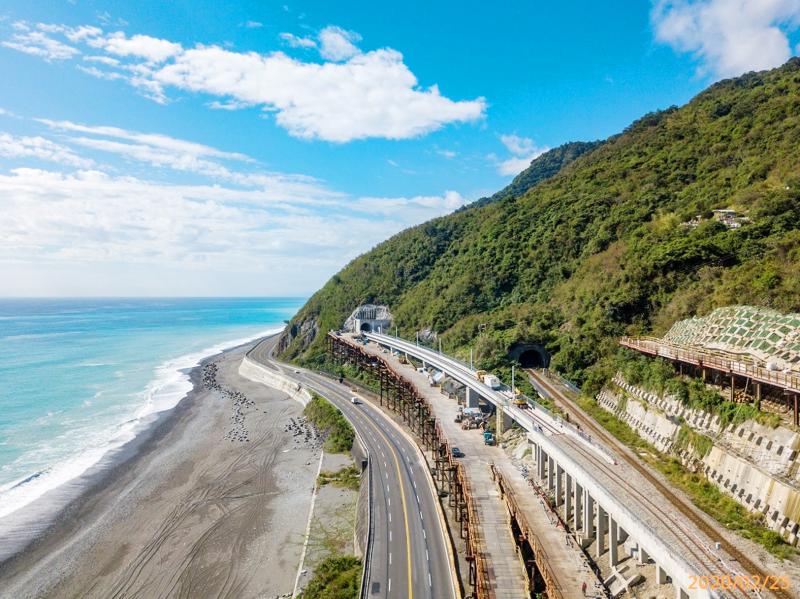The main rail route circumnavigating Taiwan would be fully electrified once the South Link Line upgrade is completed this year, the Ministry of Transportation and Communications’ Railway Bureau said on Tuesday last week.
The South Link Line is about 98.2km long and the work to electrify the line was challenging, as it had to be done after trains stopped running at midnight each day, the bureau said.
Moreover, a section between Duoliang (多良) and Longsi (瀧溪) in Taitung’s Taimali Township (太麻里) had to be moved because there was insufficient headroom in the tunnels to add electrification infrastructure, it said.

Photo provided by the Taiwan Railways Administration
As most of the South Link Line is in remote areas, most of the materials, machines and personnel had to be delivered via rail, the bureau said.
The section between Chaochou Township (潮州) and Fangliao Township (枋寮) in Pingtung County has had its electrification completed and the upgraded line has been in use since December last year, it said.
That left the section between Fangliao and Jhihben (知本) Station in Taitung as the only one in the round-Taiwan rail system yet to be electrified, it said.
Once the South Link Line is fully electrified, Taroko Express and Puyuma Express services can operate on the line, providing eastbound travelers a fast, safe, scenic, comfortable and energy-efficient rail service, the bureau said.
This would help boost the east coast’s tourism industry, it added.

Taiwan yesterday condemned the recent increase in Chinese coast guard-escorted fishing vessels operating illegally in waters around the Pratas Islands (Dongsha Islands, 東沙群島) in the South China Sea. Unusually large groupings of Chinese fishing vessels began to appear around the islands on Feb. 15, when at least six motherships and 29 smaller boats were sighted, the Coast Guard Administration (CGA) said in a news release. While CGA vessels were dispatched to expel the Chinese boats, Chinese coast guard ships trespassed into Taiwan’s restricted waters and unsuccessfully attempted to interfere, the CGA said. Due to the provocation, the CGA initiated an operation to increase

CHANGING LANDSCAPE: Many of the part-time programs for educators were no longer needed, as many teachers obtain a graduate degree before joining the workforce, experts said Taiwanese universities this year canceled 86 programs, Ministry of Education data showed, with educators attributing the closures to the nation’s low birthrate as well as shifting trends. Fifty-three of the shuttered programs were part-time postgraduate degree programs, about 62 percent of the total, the most in the past five years, the data showed. National Taiwan Normal University (NTNU) discontinued the most part-time master’s programs, at 16: chemistry, life science, earth science, physics, fine arts, music, special education, health promotion and health education, educational psychology and counseling, education, design, Chinese as a second language, library and information sciences, mechatronics engineering, history, physical education

The Chinese military has boosted its capability to fight at a high tempo using the element of surprise and new technology, the Ministry of National Defense said in the Quadrennial Defense Review (QDR) published on Monday last week. The ministry highlighted Chinese People’s Liberation Army (PLA) developments showing significant changes in Beijing’s strategy for war on Taiwan. The PLA has made significant headway in building capabilities for all-weather, multi-domain intelligence, surveillance, operational control and a joint air-sea blockade against Taiwan’s lines of communication, it said. The PLA has also improved its capabilities in direct amphibious assault operations aimed at seizing strategically important beaches,

‘MALIGN PURPOSE’: Governments around the world conduct espionage operations, but China’s is different, as its ultimate goal is annexation, a think tank head said Taiwan is facing a growing existential threat from its own people spying for China, experts said, as the government seeks to toughen measures to stop Beijing’s infiltration efforts and deter Taiwanese turncoats. While Beijing and Taipei have been spying on each other for years, experts said that espionage posed a bigger threat to Taiwan due to the risk of a Chinese attack. Taiwan’s intelligence agency said China used “diverse channels and tactics” to infiltrate the nation’s military, government agencies and pro-China organizations. The main targets were retired and active members of the military, persuaded by money, blackmail or pro-China ideology to steal